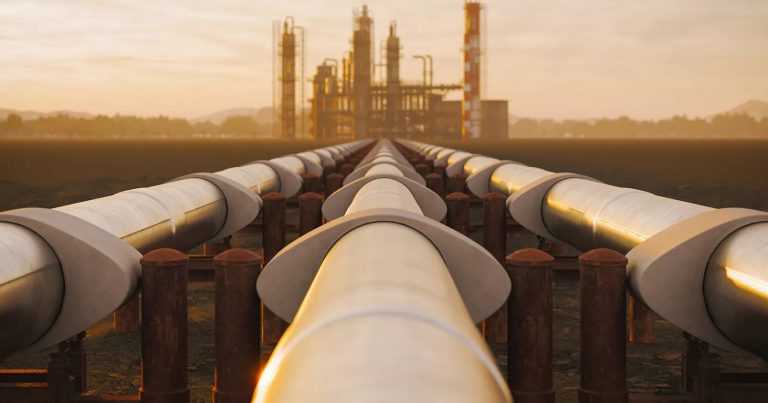
Nigeria, alongside the Economic Community of West African States (ECOWAS), Morocco, and Mauritania, reaffirmed its commitment to the $26 billion African Atlantic Gas Pipeline Project. This ambitious initiative, designed to link Nigeria with Morocco and extend to European markets, was the focal point of discussions at the ECOWAS Inter-Ministerial Meeting held in Abuja, where Ministers of Hydrocarbons and Energy from ECOWAS member states and representatives from Morocco and Mauritania strategized on advancing the project.
Envisioned to span over 5,000 kilometers and connect at least 13 African countries, the Nigeria-Morocco Gas Pipeline Project (NMGP) aims to transform the region’s economy by enhancing access to natural gas, promoting energy trade across West Africa, and bolstering Africa’s footprint in the global gas market.
Addressing the significance of this project, Mele Kyari, Group Chief Executive Officer of the Nigerian National Petroleum Company Limited (NNPC), explained that the decisions made at the meeting would “shape the future of the African Atlantic gas project” and impact the region’s economy and local communities.
Register for Tekedia Mini-MBA edition 19 (Feb 9 – May 2, 2026): big discounts for early bird.
Tekedia AI in Business Masterclass opens registrations.
Join Tekedia Capital Syndicate and co-invest in great global startups.
Register for Tekedia AI Lab: From Technical Design to Deployment (next edition begins Jan 24 2026).
Kyari, represented by NNPC’s Executive Vice President for Gas Power & New Energy, Olalekan Ogunleye, highlighted the project’s progress, with the front-end engineering design and phase two study completed, as well as ongoing work on environmental and social impact assessments, land acquisition, and resettlement efforts.
Ogunleye expressed optimism about the project’s potential to drive shared prosperity and regional development.
“These achievements underscore our shared capacity and resolve to bring this partner project to fruition, demonstrating both the project’s viability and our capability for effective execution. Supported, of course, by strong regional collaboration, which we continue to appreciate, NNPC is well positioned to progress this project by leveraging on its expertise across production, processing, transmission, and marketing,” he said.
With its extensive experience in gas production and infrastructure, the NNPC is positioned as a central player in driving the project to completion. Ogunleye emphasized the importance of robust regional collaboration, noting that the cooperation of multiple African nations underscores a shared commitment to a transformative energy initiative. The inter-ministerial meeting aimed to strengthen these alliances, ensuring each partner is aligned in advancing the project toward timely completion and effective operation.
Nigeria’s Minister of State for Petroleum Resources (Gas), Ekperikpe Ekpo, also expressed his belief in the project’s transformative power, saying, “We stand at a critical juncture where these draft agreements hold the power to reshape our energy landscape, strengthen our economies, and uplift our people.”
Ekpo noted that the agreements not only advance hydrocarbon and energy trade across ECOWAS countries but also support Africa’s larger goals of economic integration and global market relevance.
Insights from Regional Leaders
Laila Benali, Morocco’s Minister of Energy Transition and Sustainable Development, shared her optimism about the project’s capacity to unlock new markets and generate substantial employment opportunities. She praised the regional collaboration, viewing it as a critical factor in the pipeline’s potential to bring sustainable development benefits to the region and beyond.
Echoing the sentiment, Sediko Douka, ECOWAS Commissioner for Infrastructure, Energy, and Digitalisation, underscored the necessity of collective effort.
“We have reached a critical phase in the development of this project, and it’s crucial for all parties to work closely to bring it to fruition,” Douka said.
Background: A Vision Conceived in 2016
The Nigeria-Morocco Gas Pipeline (NMGP) Project was conceived in December 2016 during a visit by King Mohammed VI to Nigeria. Since then, it has evolved into one of Africa’s most significant infrastructure projects. The pipeline is designed to tap into Nigeria’s vast natural gas reserves, addressing multiple objectives, including boosting Nigeria’s gas revenue, diversifying export routes, and reducing gas flaring—a major environmental concern.
The project comprises two main components: the $975 million West African Gas Pipeline Extension Project, spanning 678 kilometers, and the larger Nigeria-Morocco pipeline, projected to cost around $25 billion. The combined pipeline will transport natural gas from Nigeria to Morocco, linking 13 ECOWAS countries before extending its reach to Europe, thus fostering economic integration and enhancing energy security within the region.
The Pipeline’s Impact on Regional Development and Global Trade
Spanning 5,300 kilometers from Nigeria to Dakhla in Morocco and extending another 1,700 kilometers onshore from Dakhla to Northern Morocco, the pipeline represents a monumental investment in West African infrastructure. It is expected to open significant economic opportunities across the region, enhancing energy access and promoting industrialization. By linking African nations to Europe, the pipeline is also anticipated to increase Africa’s competitiveness in the global gas market, positioning the continent as a key energy provider amid rising global demand for natural gas.
Beyond economic benefits, the pipeline is positioned to address critical issues such as energy poverty, a pressing challenge in West Africa. With expanded access to affordable energy, countries along the pipeline route will be better positioned to improve living standards, support small and medium-sized enterprises, and accelerate their respective industrial sectors.
However, the meeting’s participants acknowledged the challenges ahead, including securing continuous funding, managing environmental impacts, and ensuring community support throughout the pipeline’s route. The project’s ambitious scale requires seamless cooperation between governments, regional bodies, and private stakeholders.
However, the project’s progress in front-end engineering design and environmental studies reflects a readiness to address these challenges through coordinated action and innovation.



